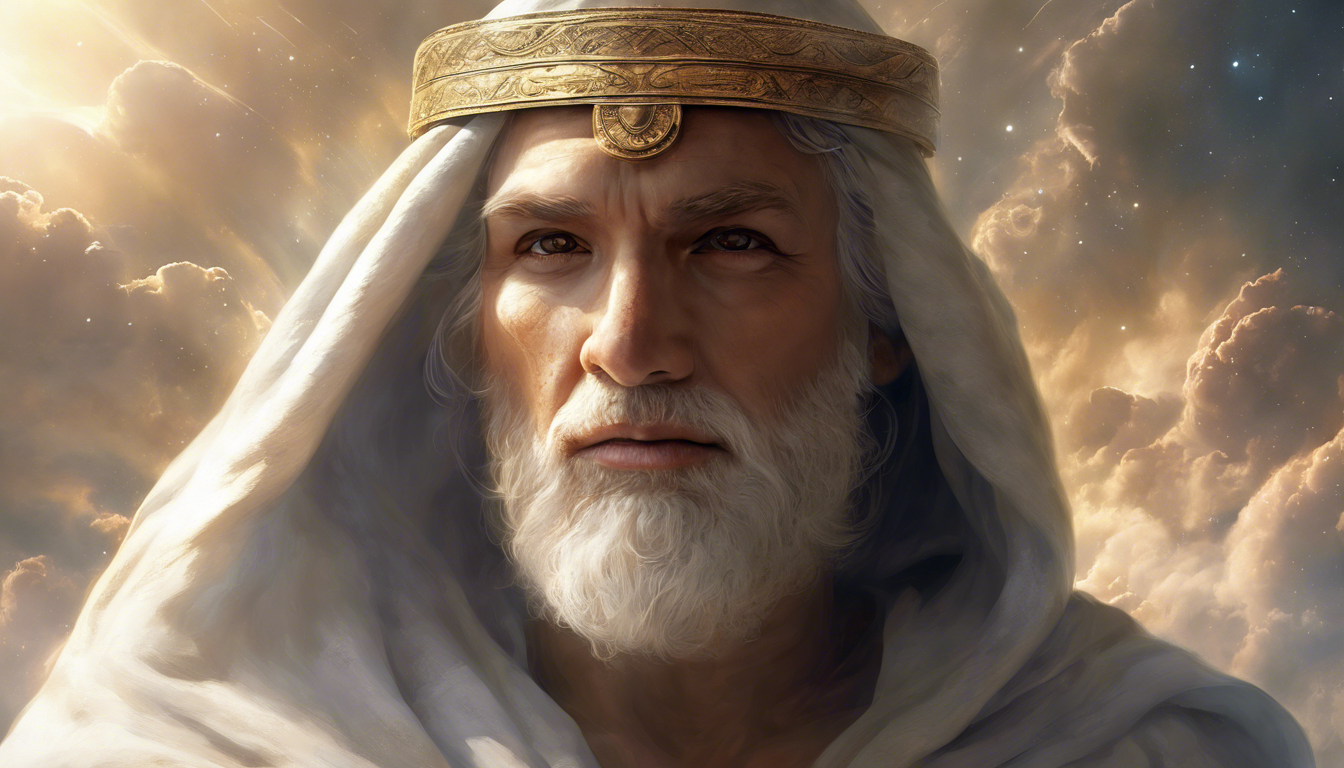Title: Were the Prophets the Voice of Ancient Israel?
Introduction: Delve into the enigmatic world of ancient Israel as we explore the question – were the prophets truly the voice of the people? Unveil the mysteries of prophecy, history, and spirituality in this captivating journey through the echoes of the past.
the role of prophets in ancient Israel

Throughout the history of ancient Israel, prophets played a significant role in shaping the religious, social, and political landscape of the nation. These individuals were viewed as messengers of the divine, tasked with communicating God’s will to the people. This article delves into the vital role played by prophets in ancient Israel and their impact on the development of the Israelite society.
divine communication and guidance
Prophets in ancient Israel served as conduits for divine communication, relaying messages from God to the people. They provided guidance, warnings, and instructions, acting as intermediaries between the divine realm and humanity. The words of the prophets were considered sacred and were believed to carry the authority of God Himself.
social justice and moral guidance
Prophets were not only concerned with spiritual matters but also with social justice and moral issues. They often spoke out against social injustices, corruption, and moral decay within Israelite society. The prophets called the people to repentance, urged them to uphold justice and righteousness, and warned of the consequences of straying from God’s commandments.
political influence and accountability
In addition to their spiritual and moral roles, prophets exerted political influence in ancient Israel. They frequently critiqued the actions of kings and rulers, holding them accountable for their decisions and policies. Prophets such as Samuel, Nathan, and Elijah played pivotal roles in shaping the political landscape of Israel and challenging the abuse of power.
legacy and lasting impact
The prophetic tradition in ancient Israel left a lasting impact on the nation’s religious identity and cultural heritage. The messages and teachings of the prophets were preserved in the Hebrew Bible, shaping the beliefs and practices of future generations. The legacy of the prophets continues to resonate in religious thought and ethics, emphasizing the importance of social justice, moral integrity, and the pursuit of God’s will.
In conclusion, the role of prophets in ancient Israel was multifaceted and crucial to the spiritual, social, and political life of the nation. Their messages of divine communication, social justice, moral guidance, and political accountability continue to inspire and challenge readers today, underscoring the enduring relevance of the prophetic tradition in ancient Israel.
the messages delivered by the prophets

Prophets in ancient Israel played a crucial role in conveying divine messages to the people. Their messages encompassed a wide range of themes and were delivered through various mediums, including oracles, visions, and symbolic actions. Let’s delve into the significant aspects of the messages delivered by the prophets in the biblical context.
diversity of messages
The messages delivered by the prophets were diverse and multifaceted, addressing various issues such as social justice, morality, idolatry, repentance, and the consequences of disobedience. Each prophet had a unique message tailored to the specific historical and societal context in which they lived.
call to repentance
A common theme in the prophetic messages was a call to repentance. Prophets urged the people of Israel to turn away from their sinful ways and return to God. They warned of impending doom if the people did not change their ways, offering the opportunity for redemption through sincere repentance.
social justice and morality
Prophets were often vocal advocates for social justice and morality. They spoke out against oppression, exploitation of the vulnerable, and corrupt leadership. Prophets like Amos and Micah condemned the wealthy elite for their mistreatment of the poor and called for a society based on righteousness and compassion.
warnings and prophecies
In addition to calls for repentance and messages of social justice, prophets also delivered warnings and prophecies regarding the future. They foretold the consequences of the people’s actions and the judgment that would befall them if they continued on their current path. Prophecies of destruction and exile were common motifs in the messages of the prophets.
hope and restoration
Despite the often bleak nature of their messages, prophets also offered messages of hope and restoration. They spoke of a future where the people of Israel would be reconciled with God, experience forgiveness for their sins, and live in harmony and prosperity. The promise of a new covenant and a renewed relationship with God provided a beacon of hope amidst the warnings of judgment.
In conclusion, the messages delivered by the prophets in ancient Israel were diverse, challenging, and ultimately hopeful. Their words continue to resonate today, urging us to seek justice, compassion, and righteousness in our own lives as we navigate the complexities of the world around us.
the impact of prophets on Israelite society

Exploring the Role of Prophets in Israelite Society
The prophets of ancient Israel played a crucial role in shaping the religious, social, and political landscape of the Israelite society. Their influence was multifaceted, encompassing various aspects of daily life and belief systems. Let’s delve into the impact of these prophetic figures on the Israelite community.
Religious Guidance and Moral Authority
Prophets served as intermediaries between the people of Israel and the divine, conveying messages, warnings, and instructions from God. Their primary function was to uphold religious teachings, critique societal injustices, and call for repentance. The prophets wielded significant moral authority, guiding the Israelites on the path of righteousness and spiritual renewal.
Social Justice and Advocacy
Many prophets championed social justice causes, advocating for the rights of the marginalized and oppressed within Israelite society. Through their prophecies, they highlighted issues such as poverty, inequality, and corruption, challenging the status quo and calling for societal transformation. The prophets were often vocal critics of unjust rulers and oppressive systems, pushing for reforms that aligned with the ethical principles of the Jewish faith.
Political Influence and Power Dynamics
In addition to their religious and social roles, prophets exerted significant influence on political affairs in ancient Israel. Some prophets served as advisors to kings, offering counsel based on divine revelations and moral imperatives. Others acted as political dissidents, confronting rulers who strayed from God’s will and advocating for governance that prioritized justice and righteousness. The prophets played a crucial role in shaping the political direction of Israelite society, often challenging the established power structures and promoting equitable leadership.
Legacy and Long-Term Impact
The legacy of the prophets continues to resonate in modern perspectives on justice, morality, and faith. Their teachings inspired religious and ethical traditions that endure to this day, influencing how societies approach issues of governance, social responsibility, and divine accountability. By exploring the influence of prophets on Israelite society, we gain valuable insights into the enduring relevance of their messages and the transformative power of prophetic voices throughout history.
In conclusion, the prophets of ancient Israel were instrumental in shaping the religious, social, and political fabric of Israelite society. Their influence was profound and far-reaching, leaving a lasting legacy that continues to inform discussions on morality, justice, and spiritual renewal. By examining the role of prophets in Israelite society, we uncover the complexities of their impact and the enduring relevance of their messages in contemporary contexts.
the relationship between the prophets and God
Prophets in ancient Israel played a crucial role in mediating the divine relationship between God and the people. Through their visions, prophecies, and teachings, these individuals conveyed messages from the divine realm to guide, instruct, and warn the community. Let’s delve into the intricate nature of this divine relationship as revealed through the prophets of the Hebrew Scriptures.
The Call to Prophethood
Prophets were often chosen by God to fulfill a specific divine purpose. They received a calling that set them apart from their peers, compelling them to speak on behalf of God. This calling was both a privilege and a burden, as prophets were tasked with delivering messages that often challenged the prevailing norms and behaviors of society.
The Relationship Dynamics
The relationship between God and the prophets was characterized by intimacy, struggle, and obedience. God’s chosen messengers were granted insights into the divine will, yet they also grappled with doubt, fear, and resistance. The prophets were called to confront injustice, idolatry, and moral decay, sometimes at great personal cost.
Communication with the Divine
Communication between God and the prophets took various forms, including visions, dreams, and direct revelations. These encounters served to strengthen the prophets’ faith, clarify their mission, and reinforce their commitment to delivering God’s message faithfully. The biblical narratives depict a dynamic exchange between the divine and the human, shaping the course of history.
The Role of Prophecy
Prophecy was not merely about predicting future events; it was a means of proclaiming God’s sovereignty, calling for repentance, and offering hope amid adversity. The prophets served as spiritual guides, moral watchdogs, and social critics, urging the people to realign themselves with God’s will and purpose.
In conclusion, the relationship between God and the prophets of ancient Israel exemplifies a profound intertwining of the divine and the human realms. Through their unique calling and unwavering commitment, the prophets bridged the gap between heaven and earth, inviting us to ponder our own relationship with the divine in today’s world.
the legacy of the prophets in the Israelite tradition
the Israelite tradition is rich with the legacy of prophets, individuals who served as intermediaries between the divine and the people. these prophets played a crucial role in shaping the religious, social, and political landscape of ancient Israel, leaving a lasting impact that continues to resonate through the ages.
In ancient Israel, prophets served as mouthpieces for divine messages, conveying warnings, judgments, encouragement, and hope to the people. They were often called to challenge injustices, idolatry, and corruption within society, urging the Israelites to return to a faithful relationship with God. Prophets such as Isaiah, Elijah, and Jeremiah are renowned for their courage and zeal in proclaiming God’s word.
the characteristics of Israelite prophets
Israelite prophets were characterized by their boldness, integrity, and unyielding devotion to their callings. They often used symbolic actions, such as sackcloth garments and prophetic visions, to convey their messages. Prophets also frequently faced opposition and persecution for their pronouncements, yet remained steadfast in their commitment to speaking the truth.
The influence of prophets extended beyond religious matters into the realms of politics and ethics. Through their warnings and exhortations, prophets sought to guide the nation towards righteousness and justice. Their prophecies often had far-reaching consequences, shaping policies and decisions at critical junctures in Israel’s history.
In conclusion, the legacy of prophets in the Israelite tradition is a testament to the enduring power of faith and prophecy. Their voices continue to echo through the ages, challenging believers to uphold truth, justice, and compassion in their own times.
